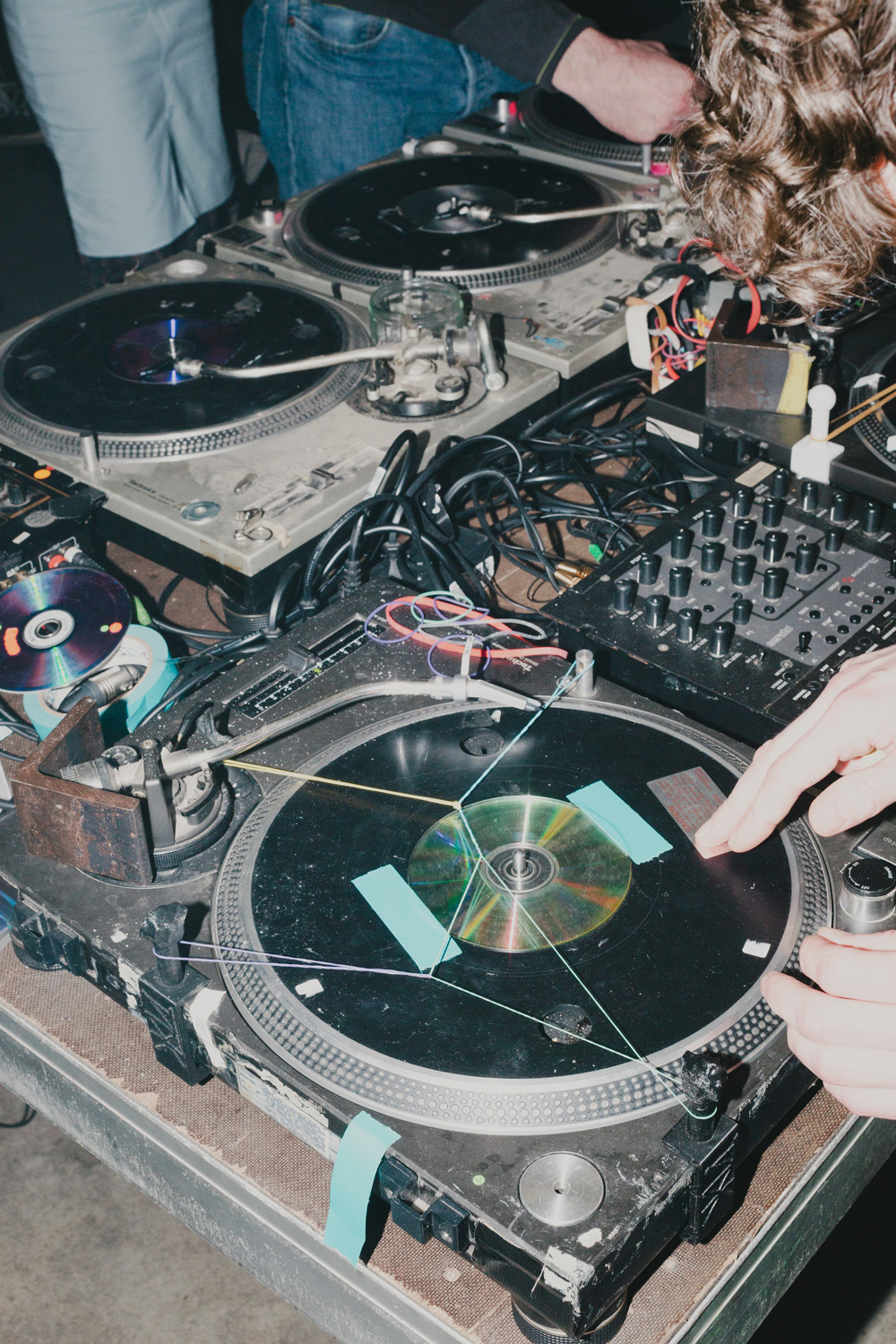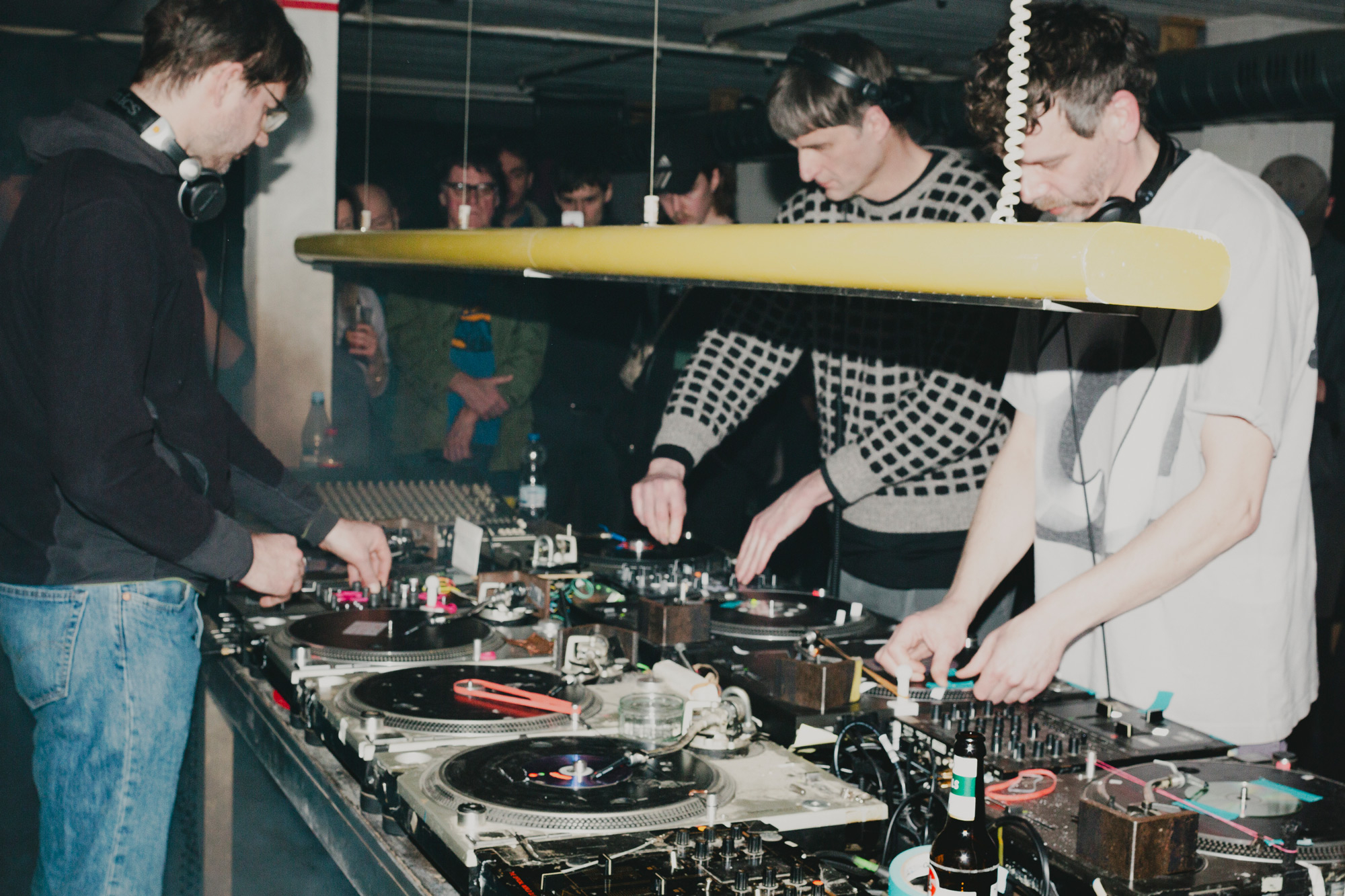BEEK presents an eclectic night that first oscillates between book presentation, performative lecture and skipping records, only to lead to dubby techno travesties before ending in a sea of the latest music that makes you wanna pogo. Collaboration with Thomas Baldischwyler and adocs Verlag.

Institut für Feinmotorik, Photo: Charlie Spiegelfeld @ BEEK
The publication Doppelte Buchführung that will be launched on this evening is a collection of 248 collages made by the German artist Thomas Baldischwyler on the basis of b/w copies of the 2004 catalogue „Formalismus. Modern Art, Today“. His analogue reworking of this documentation of a group exhibition that took place at the Hamburger Kunstverein in the same year consists of linking different layers of history and stories. Through the use of isometric grids borrowed from postmodern architecture, gestural watercolors and photographic prints and texts fixed with ephemeral-looking metal staples, the shimmering fragments of the original become incidental foundations for roughly added layers of his own work biography. In addition to a selection of his installations, the imaginary timeline includes reviews of recordings from his label Travel By Goods and some of the cover artwork he has produced for other musicians.

Institut für Feinmotorik, Photo: Charlie Spiegelfeld @ BEEK
Miriam Stoney (Lecture performance)
Miriam Stoney is an author and translator based in Vienna. Her mostly collaborative practice is text-based, but also includes artistic writing, performance, audio and installation. Her work has been shown/broadcast at the Neuer Kunstverein Wien and on BBC Introducing Arts, among others. In a spirit similar to her introduction in Baldischwyler's publication „Doppelte Buchführung“, she will open the evening with a text written especially for the occasion.
Institut für Feinmotorik (Live)
The IFF is a Berlin-based media art group consisting of Marc Matter, Daniel van den Eijkel and Florian Meyer, which specialises in acoustic art. During their performances, they operate eight record players, four DJ mixers and two mono compressors. They usually work with vinyl records and use run-out grooves, empty grooves or the paper of the record label as well as additional stickers on the disc as sound generators. Often, however, they also dispensed with vinyl completely and worked exclusively with empty turntables as acoustic sources, turning the void into a rave.
Broken Celery (DJ)
In American rom-coms, you often see the protagonists drifting to gigantic fridges at night in search of celery in the vegetable compartment. Few people realise that celery relaxes and promotes sleep and, despite these calming attributes, can also have an aphrodisiac effect. I wonder what the DJ couple, who play under the protection of anonymity, were thinking when they chose the name Broken Celery? Perhaps it was more important to them that celery is a plant that rarely goes limp and sounds like the snare of an 808 drum computer when broken, even in its old state. In any case, their DJ set will sweat ecstatic, chopped'n'screwed chlorophyll without ceasing.
pq (DJ)
UK native pq has been one quarter of the intercontinental band project Nihiloxica since 2016. In internal communication, he and his fellow musicians categorise their sound as "traditional techno". In external communication, however, the nature of their music should remain ambivalent, as pq noted in an interview: "In general, we try to avoid the term techno. This pigeonhole is a little too narrow for us. Our horizon is much broader than just techno!" Pq will also prove this in his DJ set, which will not only be a showcase for the Spooky Shit label he runs with Spooky-J and Ekhe, but also an excursion into the history of music beyond 160 beats per minute.
BEEK
Marschnerstraße 21
22081 Hamburg